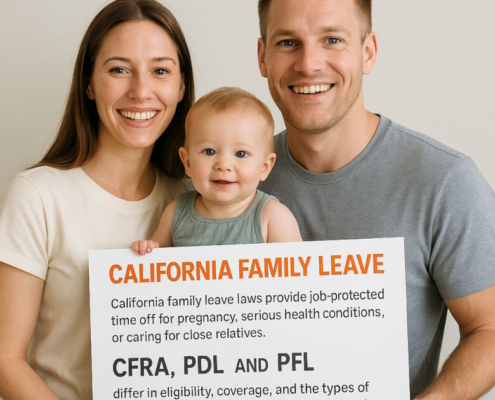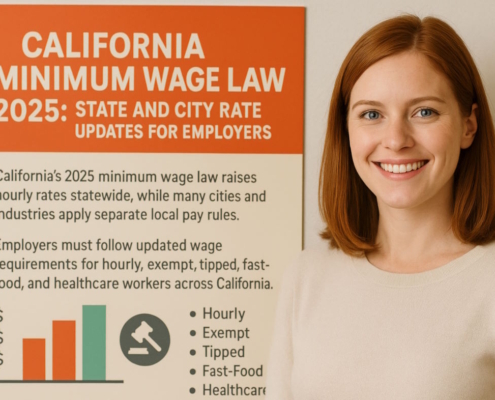Are you allowed to breast pump or breast feed at work in California?
When it comes to employee protections for breastfeeding mothers, California is among the nation’s strongest. Your employer must grant you a fair amount of break time and offer you with a private space to express milk, other than a restroom. The state of California has strict penalties for those who fail to do so.
Federal statutes already in place offer further safeguards. An example is the PUMP Act, which, after its enactment in 2022, allows employees to sue their employers for noncompliance, regardless of whether they have formally complained. The following situations allow for the expedited filing of a lawsuit:
- For not following the rules about break time.
- Your company has made it clear that they will not be offering a designated area for you to pump in private.
- You may have lost your job because you asked for more time off or a quiet place to pump.
There is a possibility of conflict due to the ever-changing nature of federal and state laws. In such cases, the legislation that provides more robust safeguards for employees will always take precedence. The same holds true for local legislation passed by counties or towns, such the San Francisco Lactation in the Workplace Ordinance, which provide greater protection than state regulations. When it comes to lactation accommodation rules in California, complaints and investigations are handled by the Labor Commissioner’s Office.
My baby is still breastfed, and I have to express milk while I’m at work. In what ways am I protected?
California law guarantees nursing mothers the right to an area free of distractions and adequate breaks so they can express milk while on the job. Your designated place must not be a restroom, be near your desk, be out of sight and out of reach of both employees and customers, and be free of intrusion. In addition, there can be no clutter, danger, or other potentially harmful items in the area.
In addition to having a seat and a flat surface to set up a pump, the ideal area would also be close to a refrigerator and a wash basin with running water, as well as have access to power or instructions on how to use a battery-powered or electric pump.
Are breaks for breastfeeding paid?
Most likely. When you need a longer break from work than your normal paid break time, your employer can (but is not required to) compensate you. Therefore, if you normally get a 15-minute paid break and you end up taking 25 minutes to express milk, your boss is not obligated to pay you for the remaining 10 minutes. Nevertheless, the time spent traveling to and from the lactation space should be compensated as it is not considered break time.
How long can you take a break to breastfeed?
For each break, you are free to take as much time as you need, within reasonable limits. The number of breaks you may take to express milk is up to you. You don’t have to take nursing breaks during your regular breaks. You can take breaks at other times as well, but you aren’t required to get paid for those times.
For how long can I use the breastfeeding room at work?
You have the right to keep expressing milk at work for as long as you need to. California does not restrict lactation accommodations based on the child’s age, in contrast to federal law.
Would my employer be able to discriminate against me if I asked for or took a breastfeeding break?
No. It is against the law for your employer to treat you differently because you are a breastfeeding mother, a person with a medical condition that affects your ability to breastfeed, or because you seek or take a lactation break. It is also against the law for your employer to make you feel uncomfortable only because you are using your breast, pump, or tube to feed your baby while on the job.
Your company’s policy regarding paid lactation breaks should mirror that of other breaks. If workers can have coffee or cigarette breaks without punching in, then they should also be able to pump milk without punching in while they are breastfeeding.
If my boss refuses to provide reasonable accommodations or breaches my rights, what can I do?
The law is enforced in part by various government entities. A complaint to the U.S. Department of Labor, the Retaliation Investigation Unit and Bureau of Field Enforcement of the California Division of Labor Standards Enforcement, and the California Department of Fair Employment and Housing may help you assert all of your rights. You will also be able to sue your employer starting in 2022 thanks to the federal PUMP Act.
Those low-wage workers who are confused about how their employers can accommodate breastfeeding or who feel their rights have been infringed can reach out to Legal Aid At Work for assistance. Workers in California have access to a wealth of information through the Work and Family Coalition. You may find a wealth of information to help you stand up for your rights at the UC Center for Worklife Law.
What is the best way to approach my workplace about making accommodations for nursing?
The best way to get your rights to breastfeeding accommodations recognized is to talk about them. The state of California mandates that all employers have a written lactation policy and recommends that all employees receive this policy when hired, when requesting leave, and upon returning from pregnancy-related leave. However, not all employers have mechanisms to guarantee that employees actually follow these recommendations.
But the breastfeeding policy must be in place. Once you feel comfortable telling your job about your pregnancy, ask to view it. Before you go on leave, make sure you and your supervisors read over the policy, find the lactation spaces, and notify your employer if you think they don’t meet state criteria. The California Law Guide for Employers is a good reference that you may provide them with. This will give them plenty of time to make sure everything is in order before you go back to work after childbirth.
Stumped for words? Here’s an idea to get you going:
Being a successful mom and employee is important to me. To assist reduce the likelihood of sickness, my doctor has advised that I breastfeed my baby. With your help, it will be much easier. All I need is [fill in the blank with your space requirements, break time requirements, etc.]. That’s all.































